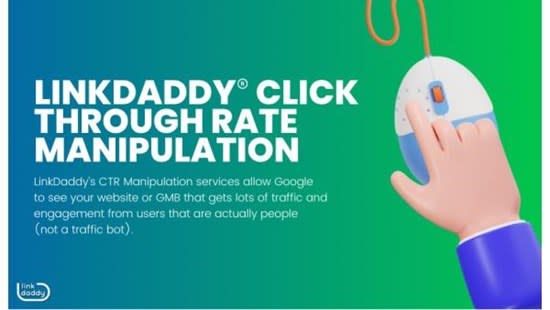LinkDaddy CTR Manipulation: Specialized Services for Boosted Internet Website Traffic
LinkDaddy CTR Manipulation: Specialized Services for Boosted Internet Website Traffic
Blog Article
Discovering the Relationship In Between CTR Control Services and User Habits
In the realm of digital marketing, the impact of click-through rate (CTR) control solutions on user actions remains a complex and appealing topic. As on the internet systems progressively depend on CTR metrics to measure the success of content, products, and solutions, recognizing how these controlled rates effect customer involvement and decision-making processes is critical. The interplay in between CTR adjustment and customer habits questions regarding credibility, credibility, and the honest effects of such techniques. By dissecting the intricate relationship between CTR manipulation services and individual habits, appealing understandings arise that might reshape our understanding of digital advertising methods and their impacts on customers.
Influence of CTR Manipulation on Behavior
Assessing the impact of Click-Through Rate (CTR) manipulation on customer actions exposes vital understandings right into the characteristics of online involvement. CTR adjustment involves unnaturally pumping up the variety of clicks on a specific web link or promotion to trick users and search engines. This technique can cause a distorted assumption of a web page's appeal or relevance, inevitably impacting customer habits.

Furthermore, CTR adjustment can alter the data used by algorithms to individualize user experiences. This can result in individuals being offered web content that does not line up with their preferences or passions, eventually bring about a decline in customer complete satisfaction and involvement. Understanding the impact of CTR control on user actions is vital for keeping openness and rely on on the internet interactions.
Individual Involvement With Adjusted CTR
User engagement with manipulated CTR data typically brings about skewed perceptions of on the internet material appeal and importance. When customers interact with content based on synthetically inflated Click-Through Rates (CTR), they may believe that specific info, items, or services are more popular or trustworthy than they actually are. This can result in users choosing based on misleading data, leading to possibly negative outcomes.
Engagement metrics like likes, shares, comments, and time invested in a webpage are usually affected by CTR adjustment. Customers might be much more inclined to involve with content that appears to have greater involvement prices, even more perpetuating the cycle of skewed perceptions. Therefore, content makers and marketers might prioritize producing content that generates high CTR as opposed to concentrating on creating genuinely beneficial and appropriate product.

Mental Impacts of CTR Manipulation

Additionally, the mental impacts of CTR manipulation can likewise show up in altered decision-making procedures. Users may be much more likely to click material exclusively based upon its regarded popularity, as opposed to its real value or relevance to their demands. This behavioral shift can lead to a surface interaction with online web content, where individuals may forget high-grade however less preferred offerings in favor of those with artificially improved CTRs.
Essentially, the emotional ramifications of CTR adjustment highlight the significance of maintaining openness and authenticity in on-line interactions to cultivate authentic customer interaction and trust.
Moral Considerations in CTR Adjustment
CTR control increases issues regarding deceiving users, distorting information analytics, and endangering the reliability of on the internet content. By unnaturally inflating CTR, customers may be misdirected into clicking on links or advertisements they would not have actually selected he has a good point or else, leading to an insincere online experience.
Another moral facet to ponder is the fairness of adjusting CTR to get an unjust advantage over rivals. Participating in such methods not only violates concepts of reasonable play however also threatens the depend on that individuals place in online systems. It is necessary for companies and digital marketers to promote moral requirements in their techniques to make sure transparency, credibility, and lasting sustainability in the on the internet environment.
Ramifications for Digital Marketing
With the enhancing dependence on digital systems for marketing purposes, the practice of adjusting click-through rates (CTR) postures considerable effects for the efficiency and honesty of digital advertising and marketing techniques. CTR manipulation can cause manipulated data analytics, misdirecting marketing professionals right into believing that their projects are performing much better than they in fact are. This can result in misallocation of sources, with firms investing in underperforming methods based on falsified CTRs. When customers realize that CTRs have been controlled, it can wear down trust fund in the brand name, leading to long-term negative repercussions for client commitment and brand name online reputation.
In addition, the usage of CTR adjustment solutions can produce an unjust competitive landscape, where companies that engage in such techniques obtain an artificial benefit over those that stick to moral advertising requirements. This can stifle innovation and creative thinking in electronic advertising, as success ends up being more concerning adjustment techniques than supplying real worth to consumers. Ultimately, the effects of CTR control for digital marketing expand beyond short-term gains, influencing the general sustainability and reputation of advertising efforts in the electronic world.
Final Thought
In conclusion, the partnership between CTR manipulation solutions and customer behavior is intricate and diverse. The impact of CTR adjustment on habits, customer interaction with manipulated CTR, mental effects, moral considerations, and useful content effects for digital advertising and marketing all contribute in forming this connection. Understanding these dynamics is essential for marketers and scientists alike in order to browse the honest effects and make best use of the efficiency of their electronic marketing methods.
Report this page